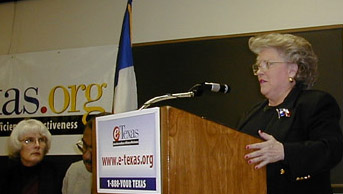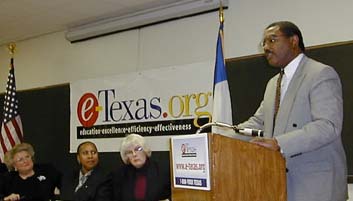| Education Task Force
College Station, February 2, 2000
Texas Comptroller Carole Keeton Rylander Hears Education Concerns in the Brazos Valley
Summary
 The future of education hinges on the direction of high tech and how it is used from high school through college, according to testimony at Texas State Comptroller Carole Keeton Rylander's recent e-Texas hearing. The future of education hinges on the direction of high tech and how it is used from high school through college, according to testimony at Texas State Comptroller Carole Keeton Rylander's recent e-Texas hearing.
 Comptroller Carole Keeton Rylander
Comptroller Carole Keeton Rylander
talks to Brazos Valley crowd.
|
 Comptroller Rylander held the second in a series of e-Texas public hearings on Wednesday on the campus of Texas A&M University. A roomful of parents, educators, students and public officials were on hand for an
open discussion of public education in the 21st century. She was introduced by Dr. Thomas Saving, Texas A&M professor and e-Texas Commissioner.
Comptroller Rylander held the second in a series of e-Texas public hearings on Wednesday on the campus of Texas A&M University. A roomful of parents, educators, students and public officials were on hand for an
open discussion of public education in the 21st century. She was introduced by Dr. Thomas Saving, Texas A&M professor and e-Texas Commissioner.
 "Nothing is more important than education," Comptroller Rylander said. "High tech is one of the major engines of economic growth in Texas and it is going to be an even greater engine in the future." "Nothing is more important than education," Comptroller Rylander said. "High tech is one of the major engines of economic growth in Texas and it is going to be an even greater engine in the future."
 She noted that "higher education has got to be actively involved in improving public education," for Texas to successfully meet the challenges of the 21st Century. She noted that "higher education has got to be actively involved in improving public education," for Texas to successfully meet the challenges of the 21st Century.
Major issues
 Major issues raised by panelists and audience members included: Major issues raised by panelists and audience members included:
- The importance of giving students the technology skills that will be required to participate in the modern workforce.
- The importance of high schools, community colleges and universities in providing continuing education for adults.
- The opportunity that communications technologies offer for providing education to those who struggle in or do not have time for traditional settings.
- The need to provide resources so that new technologies can be used to deliver education in new, innovative ways.
Panelist commentary
 "There are only 58 openings in pro basketball, but there are 346,600 in technology, " Randy Corbin, account manager for Cisco Systems, said. "There are only 58 openings in pro basketball, but there are 346,600 in technology, " Randy Corbin, account manager for Cisco Systems, said.
 Mr. Corbin talked about e-learning and his company's Networking Academy which is designed to teach students the necessary skills for those technology jobs. This program offers training and potential Cisco certification by partnering with school districts, high schools and colleges. The program has almost 4,000 academies in 50 states, the District of Columbia and in more than 50 countries. Texas is second only to California in the number of academies. Mr. Corbin talked about e-learning and his company's Networking Academy which is designed to teach students the necessary skills for those technology jobs. This program offers training and potential Cisco certification by partnering with school districts, high schools and colleges. The program has almost 4,000 academies in 50 states, the District of Columbia and in more than 50 countries. Texas is second only to California in the number of academies.
 Dr. Jim Scales, superintendent for College Station ISD, described how his district has integrated technology into all of its schools. Every school is wired for Internet connections and each school has at least one teacher trained as a "technology facilitator." These teachers train other teachers at the schools and are able to handle technology problems as they arise. Dr. Jim Scales, superintendent for College Station ISD, described how his district has integrated technology into all of its schools. Every school is wired for Internet connections and each school has at least one teacher trained as a "technology facilitator." These teachers train other teachers at the schools and are able to handle technology problems as they arise.
 Comptroller Rylander, e-Texas Education Task Force member Dr. Judy Flakes Nwachie, and Director of Distance Learning for Texas A & M University Elizabeth Tebeaux listen to Dr. Superintendent for College Station ISD Jim V. Scales describe how his district has integrated technology into all of its schools.
Comptroller Rylander, e-Texas Education Task Force member Dr. Judy Flakes Nwachie, and Director of Distance Learning for Texas A & M University Elizabeth Tebeaux listen to Dr. Superintendent for College Station ISD Jim V. Scales describe how his district has integrated technology into all of its schools.
|
 In addition to improving instruction, having students gain experience with computers and information technology better prepares them for the workforce, Dr. Scales said. In addition to improving instruction, having students gain experience with computers and information technology better prepares them for the workforce, Dr. Scales said.
 "Technology is a platform to provide better educational opportunities to all students," Dr. Scales said. "(Schools must) prepare kids to leave schools and be marketable. They can't be marketable if they are not comfortable with technology." "Technology is a platform to provide better educational opportunities to all students," Dr. Scales said. "(Schools must) prepare kids to leave schools and be marketable. They can't be marketable if they are not comfortable with technology."
 Michael Welch, director of Educational Technology at Blinn College, discussed a number of challenges to seamlessly integrating technology in education. Michael Welch, director of Educational Technology at Blinn College, discussed a number of challenges to seamlessly integrating technology in education.
 One major obstacle is that "public agencies and institutions do not have the resources to hire the technology people they need," Mr. Welch said. One major obstacle is that "public agencies and institutions do not have the resources to hire the technology people they need," Mr. Welch said.
 He also described an innovative collaborative program between Blinn College and Brenham ISD in which Blinn offers concurrent enrollment for Brenham ISD students by delivering courses over the Internet. He also described an innovative collaborative program between Blinn College and Brenham ISD in which Blinn offers concurrent enrollment for Brenham ISD students by delivering courses over the Internet.
 "Providing opportunities for Texans to continue their education is a primary goal of community colleges," Mr. Welch said. "Seamless education begins in pre-school, continues through elementary, secondary, post-secondary and on-the-job training." "Providing opportunities for Texans to continue their education is a primary goal of community colleges," Mr. Welch said. "Seamless education begins in pre-school, continues through elementary, secondary, post-secondary and on-the-job training."
 Elizabeth Tebaux, director of Distance Learning at Texas A&M, said that today's students "want and need more flexibility." Texas A&M is trying to meet that demand by providing more opportunities for distance and online learning. Elizabeth Tebaux, director of Distance Learning at Texas A&M, said that today's students "want and need more flexibility." Texas A&M is trying to meet that demand by providing more opportunities for distance and online learning.
 "Forty-one percent of undergraduate students in the United States are 24 years or older, 40% of all undergraduate students attend school part-time, 80% commute to college, and 89% work while going to school," Ms. Tebaux said. "Forty-one percent of undergraduate students in the United States are 24 years or older, 40% of all undergraduate students attend school part-time, 80% commute to college, and 89% work while going to school," Ms. Tebaux said.
 Therefore, the delivery of education needs to be flexible in order to meet the demands of today's students. The Texas A&M distance learning network has 100 sites in 42 cities. The program focuses on professional development and masters degree programs, currently offering four masters programs with six more in development. One example is a masters program in engineering that A&M offers to students in Venezuela. She also noted that lack of funding for such programs is an obstacle to further expansion. Therefore, the delivery of education needs to be flexible in order to meet the demands of today's students. The Texas A&M distance learning network has 100 sites in 42 cities. The program focuses on professional development and masters degree programs, currently offering four masters programs with six more in development. One example is a masters program in engineering that A&M offers to students in Venezuela. She also noted that lack of funding for such programs is an obstacle to further expansion.
 Mr. Welch of Blinn College and two audience members noted that some high schools are now partnering with community colleges to deliver college classes to high school students over the Internet. Mr. Welch of Blinn College and two audience members noted that some high schools are now partnering with community colleges to deliver college classes to high school students over the Internet.
 Edis Oliver, a panelist and e-Texas task force volunteer, described a program in which districts are having students build and repair computers as part of Vocational Education classes. Edis Oliver, a panelist and e-Texas task force volunteer, described a program in which districts are having students build and repair computers as part of Vocational Education classes.
Public comments
 Several audience members argued that a change was needed in formula funding for higher education in order to encourage the development of distance learning programs. Several audience members argued that a change was needed in formula funding for higher education in order to encourage the development of distance learning programs.
 Others noted the importance of developing incentives for teachers to get training in using technology. Without such training, much technology spending may go to waste. Others noted the importance of developing incentives for teachers to get training in using technology. Without such training, much technology spending may go to waste.
 One audience member discussed the Florida High School, which offers a completely Internet-based curriculum. (See our January 2000 Texas Innovator for more details.) It was originally designed for alternative education students, but is now being used by all kinds of students. He suggested that Texas should consider developing an Internet-based curriculum. One audience member discussed the Florida High School, which offers a completely Internet-based curriculum. (See our January 2000 Texas Innovator for more details.) It was originally designed for alternative education students, but is now being used by all kinds of students. He suggested that Texas should consider developing an Internet-based curriculum.
|

